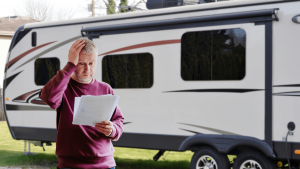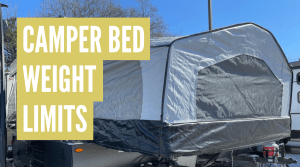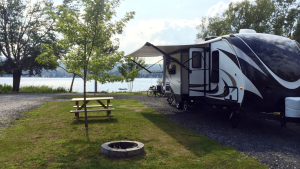Camper FAQs is reader-supported. Buying through links on our site may earn us an affiliate commission. As an Amazon Associate I earn from qualifying purchases.
With all the information about RVs floating about, it’s pretty easy for an RV beginner to get overwhelmed and feel intimidated.
We were all beginners once, so we understand completely.
In this post, we’ll cover the best RV tips and tricks that we wish we knew as a beginner to help you prepare for your first RV trip!
1. Decide Whether to Buy or Rent
Before you pile in and head out, the first quick tip you should consider is to decide whether to buy or rent an RV. Given that both options have pros and cons making this decision isn’t always easy.
If you plan on regularly RV camping, it’s in your best interest to purchase an RV. On the other hand, if you plan on going on a single trip, it’s advisable that you rent an RV.
As noted, deciding whether to buy or rent an RV isn’t always an easy decision. Whether you choose to buy an RV or simply rent one, you should do so at a notable dealer. Your dealer-of-choice should have a good reputation, a broad range of RVs, and be trustworthy.
As much as all RV dealers claim to be reliable, this isn’t always true. So, do your homework.
To avoid getting an RV that’ll constantly develop issues while on the road, make sure that you buy/rent an RV from a reputable RV dealership that possesses the qualities mentioned above.
Additional Tip: You can save thousands of dollars by buying your RV at the right time. See When Is the Best Time to Buy a Camper for more information.
Key Takeaway
Before anything else, first, decide whether you want to buy or rent an RV. They each have their pros and cons. Then find a reputable dealer to buy/rent from. Read reviews of local dealers and ask experienced friends who they prefer.
2. Pick the Right RV

Given that there are plenty of RVs on the market, you may find it challenging to find a reliable model that checks all the boxes.
An important RV tip you need to be aware of is that to pick the right RV, you must first figure out the type of camping experience you’re after.
Different individuals tend to have different experience goals. That being the case, when searching for an RV to buy/rent, you should go for one that’ll enable you to achieve your experience goals.
Secondly, after figuring out what kind of camping you’ll be doing, you must then figure out the number of people you’ll be doing it with.
The RV or motorhome you choose must be sizeable enough to accommodate those you’ll be camping with. If you are camping with about 4-6 people, you should purchase/rent a bigger rig, such as a fifth wheel or Class A.
If you are camping with only one individual, choosing a smaller RV or even a camper van might make more sense.
Furthermore, make a list of options and amenities that are important to you. Will you be towing a vehicle behind your RV? Or do you plan on towing your camper (for example, a travel trailer)? Do you need separate bedrooms? A full bathroom? These are just some of the many questions you should ask yourself.
Visualize yourself on a trip and really consider what you will need and won’t need. This will help you narrow down the best RV for your camping experience.
Key Takeaway
All in all, it’s important to pick the right type of RV. What type of camping will you be doing? How many campers will be living in the RV? Will you be towing a vehicle? What amenities are important (and which aren’t). Answering these questions before buying or renting will save you a ton of stress in the future.
3. Get to Know Your RV and Give Yourself Time to Get Acclimated
Even if it’s a rental, you must learn how your RV works… before going on a trip!
When you get to know your RV, you’re less likely to make operational errors that can lead to accidents, maintenance issues, and other problems.
No matter the kind of RV you get, it’s going to take time to get used to it. It’s also going to take time to adapt to RV traveling. If you want to enjoy your camping experience, it’s critical that you afford yourself the time to get used to RV life.
Key Takeaway
Get to know your RV in and out. Test drive it in a parking lot. Practice backing it up. Don’t rush yourself. If you do, you’re setting yourself up for potential failure. Although many individuals tend to ignore this RV tip, it’s extremely important.
4. RV Packing Tips for Beginners
If you plan on going on a camping trip, there are some accessories that just make life easier. Will you survive without these accessories? Sure. But your trip will not be as enjoyable without them.
Arguably, one of the most important accessories to bring along is a quality freshwater hose.
During your trip, you’ll need fresh water to cook, shower, clean utensils, and so on. Thus, you have to connect to city water and/or fill your fresh water tank with water. To do this, you need to have a suitable potable water hose.

Camco 25ft Premium RV Drinking Water Hose
Price:Clicking this link to make a purchase may earn us a commission at no additional cost to you.
Apart from a freshwater hose, you will want to use an RV water filter. To keep the water in your freshwater tank fresh as long as possible, you have to use a water filter. There are several types of RV water filters, but I recommend the Camco TastePURE RV water filter.

Camco TastePure RV Water Filter
Price:Clicking this link to make a purchase may earn us a commission at no additional cost to you.
Other important RV essentials include:
- Shore power cord and adaptors
- A surge protector to help protect your RV’s electrical system
- An RV sewer hose to empty your waste tanks (grey and black tank)
- Propane (if your recreational vehicle uses it). See our guide titled how long does propane last in an RV to calculate how much propane you will need.
- An RV generator that can work for hours and has low maintenance costs
- An electric heater for RV use for those cold nights (and days)
- Household items like toilet paper, kitchen utensils, cleaning supplies, etc
Key Takeaway
We could go on and on about what camping gear you should pack, but everybody’s RV packing list will be different. Just don’t forget the essentials like a clean water hose and filter, power cords, sewer hose, etc. I recommend making an RV camping checklist of items before you leave to help ensure you don’t forget anything (which, trust us, you still will).
5. Plan Your Journey

When your home is on wheels, it’s logical that, at times, you may want to go on a trip spontaneously.
As fun as this sounds, it has its downsides. We’ve heard many tales of campers who have gotten lost while on spontaneous trips, run into severe financial troubles, and so on. To avoid such a fate, it’s in your best interest to plan your trip ahead of time.
When you plan your journey, you’ll be able to budget adequately for the trip and know the amount of food supply you need to have. You’ll also be able to identify the route you’ll take and alternate routes that you may need to use, the accessories you require for the trip, etc.
Key Takeaway
Don’t wing it. Plan your trip carefully ahead of time. We’ve all wanted to just hit the road and go. It always sounds like a great idea, until it isn’t. As much as this RV tip sounds like a buzzkill, it’s an important one.
6. Be Strategic When It Comes to Choosing Campsites
Over the last couple of years, the number of open campsites has witnessed an immense rise.
This can be attributed to the fact that more and more people have been taking up camping as a hobby. Plus, studies show that people feel safer traveling and vacationing in an RV since the pandemic began (see our RV Statistics page for more cool stats like that).
To identify the right campground for you, you need to identify your camping style. Do you require electrical, water, and waste hookups? Do you enjoy the amenities some campgrounds offer like swimming pools, bathrooms, and showers, etc.? Do you have a tight budget?
Or maybe you want to try boondocking. What does boondocking mean? It is essentially camping off-grid, without any of the amenities you would find at an RV park.
Understanding what you need out of a campground instead of just randomly choosing one can help you save money, time and stress.
Tip: Make use of apps like The Dyrt to help find the perfect campground.
Key Takeaway
Identifying your camping style will help you find out which campsites are suitable for you and which ones aren’t. There are an endless amount of places to park your RV, so find the option that best fits you and your style.
7. Get Insurance Coverage

In recent years, the number of RV owners who’ve been getting their RVs insured has remarkably increased. This is because, unlike in the past, RV insurance coverage is now fairly affordable.
By getting insured, you’ll enjoy personalized benefits and peace of mind while traveling.
Tip: Even if you’re renting an RV, get insurance to cover that particular trip.
The cost to insure your RV will vary depending on your location, how often you use it, and a multitude of other factors. But you can expect to pay an average of $1500 per year for full-time RV insurance.
Key Takeaway
It’s a no-brainer, but get insured! It’s well worth it as anything can happen on the road (or in your RV). Plus, you’ll be able to relax and enjoy your trip a lot more knowing you’re covered.
8. Join RV Clubs
To foster a sense of togetherness and community, and in many cases, to save money, a number of RV clubs have been established.
And as a beginner, you’ll be able to get numerous RV camping tips that only experienced RV drivers can give. This information is priceless.
There are many different types of clubs available to join – general interest clubs, brand-specific clubs, membership discount clubs, etc. – so join the clubs that make sense for you.
A few example RV clubs include:
- Passport America: Our favorite discount club offering 50% off thousands of different campsites.
- Thousand Trails: A campground membership with discounts and perks.
- Escapees: Arguably the largest general-interest RV club out there.
- North American Family Campers Association: A great club with meetups so you can meet fellow campers.
- Fulltime families: A group of full-time RV’ers who travel with their families.
There’s a club for just about everything RV-related. Here is a big list of RV membership clubs you can check out.
Key Takeaway
Joining an RV club(s) can help beginners fast-track their RV camping knowledge, meet like-minded people, and save money!
For more first-time RV camping tips, check out RV Vacations For Dummies! It’s packed full of safety best practices, trip planning tips and tricks, and much more.

RV Vacations For Dummies
Price:Clicking this link to make a purchase may earn us a commission at no additional cost to you.







Write a comment